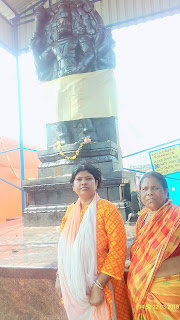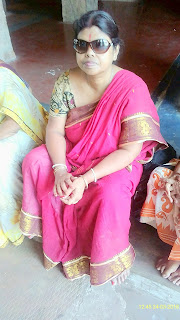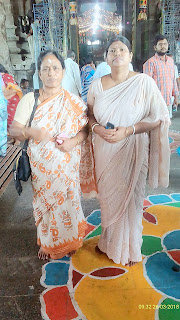(13th March to 3rd April 2018)
18 April 2018
South India Religious Tour
Madhyamgram, Kolkata, west Bengal
South India
23 October 2015
আমার পূর্বপুরুষ গণ ও আমি - দশ পুরুষের তালিকা
My Ancestors and me - the ten generations list.
পূর্বপুরুষ গণ
|
My Ancestors & me | (দশ পুরুষ, Ten Generations) | |
| ৺ কৃষ্ণজীবন ঠাকুর | Late KrishnaJiban Thakur | (প্রথম পুরুষ, জ্ঞ্যাত, First generation) | |
| ৺ কেশব পঞ্চানন ঠাকুর | Late Keshab Panchanan Thakur | (দ্বিতীয় পুরুষ, Seconds Generation) | |
| ৺ গঙ্গাধর ঠাকুর | Late Gadadhar Thakur | (তৃতীয় পুরুষ, Third Generation) | |
| ৺ রুক্মিণীকান্ত ঠাকুর | Late RukminiKanta Thakur | (চতুর্থ পুরুষ, Fourth Generation) | |
| ৺ রামলোচন ঠাকুর | Late RamLochan Thakur | (পঞ্চম পুরুষ, Fifth Generation) | |
| ৺ বিশ্বনাথ ঠাকুর | Late Biswanath Thakur | (ষষ্ঠ পুরুষ, Sixth Generation) | |
| ৺ পার্বতীচরণ ঠাকুর | Late ParbatiCharan Thakur | (সপ্তম পুরুষ, Seventh Generation) | G.G.Father |
| ৺ তারাপ্রসন্ন ঠাকুর | Late TaraPrasanna Thakur | (অষ্টম পুরুষ, Eighth Generation) | |
| ৺ অশ্বিনীকুমার ঠাকুর | Late AswiniKumar Thakur | (অষ্টম পুরুষ, Eighth Generation) | |
| ৺ যাদবচন্দ্র ঠাকুর | Late JadabChandra Thakur | (অষ্টম পুরুষ, Eighth Generation) | |
| ৺ বনমালী ঠাকুর | Late Banamali Thakur | (অষ্টম পুরুষ, Eighth Generation) | G.Father |
| ৺ হরেন্দ্রনাথ ঠাকুর | Late HarendraNath Thakur | (অষ্টম পুরুষ, Eighth Generation) | |
| ৺ হরিপ্রসাদ ঠাকুর | Late Hariprasad Thakur | (অষ্টম পুরুষ, Eighth Generation) | |
| ৺ সুরেন্দ্রনাথ ঠাকুর | Late SurendraNath Thakur | (নবম পুরুষ, Ninth Generation) | |
| ৺ সত্যেন্দ্র নাথ ঠাকুর | Late SatyendraNath Thakur | (নবম পুরুষ, Ninth Generation) | Father |
| ৺ শচীন্দ্র নাথ ঠাকুর | Late Sachindranath Thakur | (নবম পুরুষ, Ninth Generation) | |
| ৺ বীরেন্দ্র নাথ ঠাকুর | Late BirendraNath Thakur | (নবম পুরুষ, Ninth Generation) | |
| ৺ ছায়া | Late Chaya (Chatterjee) | (নবম পুরুষ, Ninth Generation) | |
| সৌমেন্দ্র নাথ ঠাকুর | Soumendra Nath Thakur | (দশম পুরুষ, Ninth Generation) | Me |
 |
| My Ancestors - The Root of Thakur Family of Madhyamgram |
19 October 2015
মধ্যমগ্রাম ঠাকুরবাড়ীর দুর্গোৎসব সমিতি
নিচে এ্যালবাম কভারের উপরে ক্লিক করে সমস্ত বইটা দেখুন অথবা,
আরও নিচের চলন্ত এ্যালবামটা দেখুন
ওয়েবসাইটঃ http://thakurbarirpujo.business.site/
ইমেলঃ thakurbarirpujo@gmail.com
05 August 2015
Human Rights & Animal.
1.
The Human
Rights, significantly rights for the Human beings and universal in nature, till
date. However, it is not a right for what humans do.
To
apply the Human Right in India India
Viz.
the Universal Declaration of Human Rights, International Covenant on Civil and
Political Rights, Article 21 of the Constitution of India.
Source: "The right to life is the most fundamental of human rights, and like all human rights, it is something that inherently belongs to people not because of what they do, but because of the human beings they are. -Shailesh Rai, the Senior Policy Advisor at Amnesty International India..
Source: "The right to life is the most fundamental of human rights, and like all human rights, it is something that inherently belongs to people not because of what they do, but because of the human beings they are. -Shailesh Rai, the Senior Policy Advisor at Amnesty International India..
2.
The Animal
Rights, significantly rights for the Animals and universal in nature too.
However,
it is not a right for the Human beings but very well within the considerations
of what humans do.
Its
applicability is not a matter of my interpretation here.
01 August 2015
In India, capital punishments are in absence of standards of absolute and universal application.
Earlier death penalty was brutal, painful and public, later moved to less painful, humane, and now, like the major countries, need to change the penalty in alternative manner for the necessary refinement in the statute.
Article 21 in the Constitution of India provides protection of life and personal liberty and it states, "No person shall be deprived of his life or personal liberty except according to procedure established by law".
However, said exception in the Article, though fundamental in nature, provides great reliance and power in the hands of the States. Therefore, Fundamental Rights of a citizen apparently ceases due to said reliance and power in the hands of the (so called political) States, while the Court is likely to restraint itself to interfere into such an administrative order, even erroneous, since one's inability to challenge it on the grounds of contravention of Fundamental Rights due to said exception.
Furthermore, Article 72 in the Constitution of India provides power to the President to grant pardons, reprieves, respites or remissions of punishment or to suspend, remit or commute the sentence of any person convicted of any offence, however, said power, of the President, not appears to be absolute. The President’s decision, about a mercy plea, likely to influenced politically. As in the recent case, Union Home Ministry advised the President to reject it; accordingly, the President rejected a mercy plea. To grant mercy, the President needs to apply an absolute power.
The architect and framers of the Constitution of India freely borrowed the good features of other constitutions. However, on 20 December 2012, meetings of the 67th Session of the UN General Assembly adopted a fourth resolution (A/RES/67/176) on moratorium on the death penalty, where 111 countries voted in favour, 41 countries, including India, voted against, 34 countries abstained from and 7 countries were absent.
However, India voted against moratorium on the death penalty instead a majority of 111 countries voted in favour, only 41 against. Since, the framers of the Constitution freely borrowed the good features of other countries why not India, for good, voted in favour for moratorium on the death penalty.
Therefore, in India, the capital punishment needs to change in civil manner and the necessary refinement in the Statute.
Subscribe to:
Comments (Atom)












































































